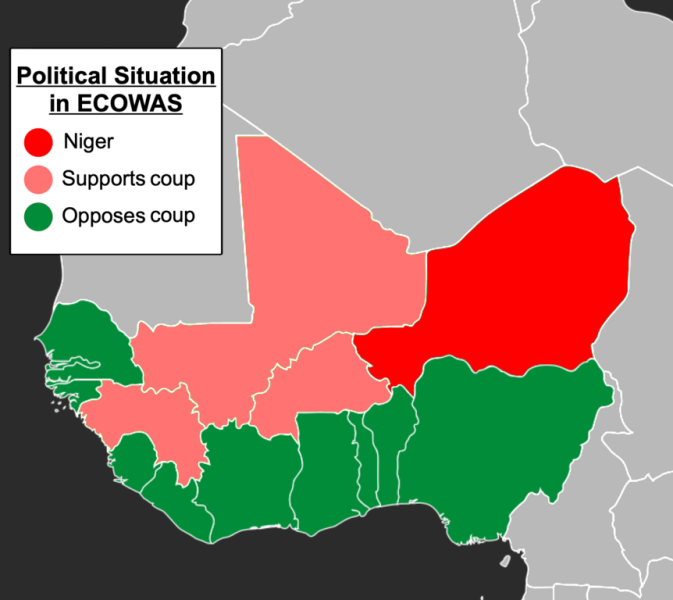In a speech about a month after a coup overthrew the President of Niger, President Emmanuel Macron re-iterated French support for the democratically elected President Mohamed Bazoum by keeping the French ambassador and envoy in the country. In addition, Macron pledged French support to any military actions the Economic Community of West African States (E.C.O.W.A.S) takes to re-instate Bazoum.
Despite condemnation from both the U.N. and the majority of African countries, the coup has gained support from many of Niger’s citizens, along with those in neighbouring Burkina Faso and Mali. These three countries have seen a rise in unrest; terrorist organizations have grown in this region since groups associated with ISIS hijacked a Malian rebellion in 2012.
The basis of the issue, and France’s stance, is that Bazoum was democratically elected. France’s policy, Macron says, is “based on the courage of President Bazoum, and on the commitments of our ambassador on the ground who is remaining despite all the pressure, despite all the declarations made by the illegitimate authorities.” This pressure has come in the form of a letter from Niger’s current military government, asking the French ambassador to leave thanks to “actions of the French government contrary to the interests of Niger.” One of the actions the letter cited as reason for the expulsion was France’s refusal to meet with Niger’s current military leadership.
It took over a month after the July 26th coup for talks between E.C.O.W.A.S. and Niger’s military government to occur, and the talks themselves made little progress. All that is known is that the military government agreed to a transition to civilian government within three years but no plan has been laid out for this yet. This comes as little surprise to those in the Sahel region, especially in Niger, Mali, and Burkina Faso – despite E.C.O.W.A.S. and U.N. initiatives, there have been more than five coups between those three countries in the last decade, and violence and terrorism have only grown. All of this has contributed to rising sentiment against France and other nations’ presence in the region, in favor of Russia and its mercenary groups.
E.C.O.W.A.S. has affirmed its commitment to pursuing diplomatic solutions, but also said that it was more than willing to hold a “D-Day style military intervention” to restore the nation’s diplomatically elected president. Current leader Abdourahamane Tchiani, meanwhile, has warned that an attempt to depose him would “not be a walk in the park” and promised that troops from Burkina Faso and Mali would stand with him in the event of a foreign attack.
Public feeling is already against foreign intervention. Anti-French sentiment and hostilities towards other nations are prevalent among Niger’s citizens, and trying to force a president the nation does not want back in power will not lessen these tensions. For better or for worse, Niger, Mali, and Burkina Faso have the right to make their own, independent decisions as to what is best for their countries, and if that involves expelling foreign nations, that nation has no grounds to say otherwise. If there is no chance that diplomacy can find a solution to restore Bazoum to the presidency, then it might be time for international forces to comply and withdraw from the area. This does not mean that all support must be completely withdrawn from Niger; if the military government will accept financial aid to its citizens, then that aid ought to be given, and if Nigeriens decide to leave the country, then France, E.C.O.W.A.S., and the U.N. should give those refugees all possible support. But further outside military or government intervention is only likely to destabilize the region further and worsen already weak relationships. The best way to demonstrate the benefits of working with outside nations to the Sahel is to respect Niger’s wishes and step back, focusing on aiding the E.C.O.W.A.S. states who will accept and effectively use the support.
- Study Shows Earth Hotter Than Expected: How To Communicate Climate Change - September 10, 2023
- French Ambassador To Remain In Niger Against Current Military Government’s Wishes - September 6, 2023
- For Now, Ceasefire Holds Between Wagner Group And Russian State - August 22, 2023


